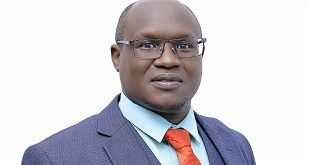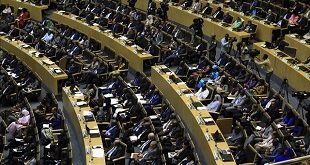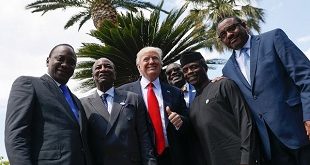
By Jocelyn Edwards
Harassment, beatings for Ugandan migrants in South Sudan
Okello (not his real name), a 19-year-old orphan from Uganda, came to South Sudan in search of a better life. Having lost both of his parents and without a job in his own country, he hoped to cash in on Juba’s booming post-war economy. But now that he is here, working as a seller of water, he’s not sure that life in South Sudan is any improvement on unemployment at home.
“Now that I have reached Sudan people are disturbing us: people are beating us and taking our money,” says Okello.
Sitting in Juba’s crowded Konyo Konyo market, where Ugandans come to sell used clothes, vegetables and other goods, the 19-year-old says that just yesterday a policeman came and demanded money from him.

“I was doing my business. The policeman came and asked me, where is your work (permit)? I said, I have it, let me go home and bring it. He said no . . . you just pay me 10 pounds.”
When Okello argued, security officers told him to lie down on the ground. “They cut me and they started to punch me,” he said.
It’s not the first time it has happened. Okello says he has lost track of the number of times he has been harassed by security forces in South Sudan. “I can’t count the number of times I have been beaten. They just come like lions and they beat,” he says.
Okello’s story is not uncommon. There are one million Ugandans living and working in South Sudan according to the Kampala City Traders’ Association. Many of them say they have faced harassment and discrimination by the country’s unruly security forces.
Hostage takings and killings
The issue of mistreatment of Ugandans in South Sudan was highlighted at the beginning of March when nine Ugandan MPs were held hostage for three hours in a disputed border region between Uganda and South Sudan. The MPs were detained at gunpoint in Lefori Sub-county by several men in the fatigues of South Sudanese army officers and policemen.
The members of parliament were on a fact-finding mission to ascertain the actual border between the two countries. But the South Sudanese authorities who held them hostage said they needed to ask for permission before entering the disputed zone.
The incidents have even gone as far as murder, according to Fred Ssenoga, the chairman of the Joint Action for Redemption of Ugandan Traders in Sudan, a group formed to seek redress for Ugandan traders against the South Sudanese government. Ssenoga reports his organisation received reports of 12 Ugandans being killed in South Sudan in January of this year alone, five of them boda boda cyclists in Jonglei state.
“They were killed (by Southern Sudan Sudanese) who said that Ugandans were taking their work,” said Ssenoga.
“We are asking, why are Ugandans being killed in South Sudan?” said the chairman. “On the Ugandan side Southern Sudanese are being treated well. Why not Ugandans in South Sudan?”
$48 million in claims
These recent incidents are just the latest in a litany of abuses done to Ugandans working in South Sudan, according to Kampala City Traders Association spokesperson (KACITA), Issa Sekkito.
Sekkito reports that, working with the ministry of trade and commerce, he has compiled a list of over 100 Ugandans seeking compensation from the government of South Sudan for harassment, confiscation of goods and property, failure of the government to pay for goods and services provided and in some cases, injuries and loss of life.
Ugandans are seeking US$48 million (Approx. Shs 120 billion) in compensation from the government of South Sudan for these incidents, according to Sekkito.
Documented cases include beatings, rape and torture. “People lost their jaws, people lost their teeth, people died, people were handicapped . . .” says Sekkito.
In the gravest of cases, like the boba boba cyclists killed in January, Ugandans who went to Juba to work simply did not end up coming back. “Talking about beating is almost not news, since there is killing,” says the KACITA spokesperson.
In the most high profile instance, the vice-chairman of the Ugandan traders association in Juba was shot in 2007 when he tried to intervene on behalf of a Ugandan youth being beaten by a policeman.
“Isolated incidents”
Elizabeth Majok, the undersecretary of the Ministry of Commerce in South Sudan, does not deny that incidents like the ones described by Sekkito may have occurred. But she says that any harassment faced by Ugandan traders is the result of actions by individuals and not institutional or systemic policy.
“I will not dispute the isolated incidents. It can happen,” says Majok. “But if there are thousands of Ugandans and one faces certain incidents, which are isolated, it shouldn’t be [taken] like it is happening to everybody.”
Majok says that the Ugandans who come to South Sudan are met with generally favourable conditions for business and are not systemically discriminated against. “The whole market is being controlled by foreigners, from retailers to wholesalers to importers- everybody. And there is no discrimination in anyway. They are being given licenses like locals and being facilitated by the Bank of Southern Sudan,” she said.
Furthermore, Majok says that some of the problems being faced by traders in South Sudan may be addressed by recent reforms in the security sector.
“(Before) there were so many institutions which were levying (fees) or harassing the traders,” she said. “Those bodies were all abolished. Now we have only two security institutions: external and internal. The other security (organisations) which were harassing people before are not relevant,” said the undersecretary.
Prejudice
Though human rights violations by security forces in South Sudan may happen to both foreigners and nationals, there is a strong undercurrent of xenophobia underlying the harassment of Ugandans, according to Ssenoga.
Ssenoga said that when intervening on behalf of Ugandan traders in Juba he was often met with prejudice. “I go to the police and they say, ‘If you had not come here, would you have faced problems?’ . . . When (Southern Sudanese) see Ugandans participating in (the economy) they think they are taking over their work.”
Improvement
But there may be some good news for Ugandans living and working in Juba.
Farouq Tusuubira, the former head of the Ugandan community in South Sudan, is a Ugandan who has lived and worked in Juba for several years.
Tusuubira says he believes that the incidents of harassment faced by Ugandans may have slowed down in recent years as law and order is established in the post-war society of South Sudan.
“In 2005, 2006, and even before independence, it was really terrible. I think as time goes on it has been improving.”
“Indeed Ugandans are subjected to some kinds of torture here but before it was worse,” Tusuubira said. “(Now) It’s not every day that they are reported but at least there are (some) incidents that are still there.”
But that’s little comfort for Ugandans currently living in South Sudan. Okello, the seller of water, stays in South Sudan only because he doesn’t have employment in Uganda.
“There are no jobs in Uganda at my side. I don’t have (anywhere) I can go and ask for a job,” says the 19-year-old. “In Uganda there is no money.”
“I fear to live here. I want to go back to my country. I fear they (the South Sudanese) will kill me,” he says.
 The Independent Uganda: You get the Truth we Pay the Price
The Independent Uganda: You get the Truth we Pay the Price


